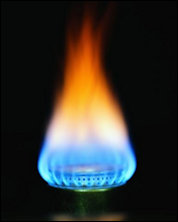Hampton Roads and other Tidewater communities see proposed natural gas pipelines in Virginia as a boon to economic development.
by James A. Bacon
While debate rages in western Virginia over the economic impact of natural gas pipelines on property values and local economies, we hardly hear a peep from the low country areas of Virginia and North Carolina that would benefit from an expanded supply of gas.
Elected officials claim, and economic developers confirm, that inadequate supplies of gas to Hampton Roads and outlying communities prevent them from competing for energy-intensive industrial customers, crimping efforts to grow their economies and create jobs.
“I’ve heard from cities and developers and builders. … We’ve got to get more capacity here,” says Sen. Bill DeSteph, R-Virginia Beach, chair of the Hampton Roads Caucus, who persuaded the region’s 33 state senators and delegates to sign a March letter supporting the proposed Atlantic Coast Pipeline (ACP).
Voices from Hampton Roads and places like Brunswick and Greensville counties, where new gas-fired power plants are being built, have been quiet during the pipeline controversy. The impact of pipeline construction is less tangible and immediate than it is for, say, landowners in the path of the ACP and the proposed Mountain Valley Pipeline. And the benefits are more theoretical — fresh gas supplies would put their communities in the running for manufacturing projects they can’t compete for now, but it’s not as if there’s a big job-creating project waiting in the wings. Natural gas proponents aren’t barraging the media with press releases, filing lawsuits or marching on the state capitol.
Still, economic developers and political leaders have quietly lined up behind pipeline development, especially the Atlantic Coast Pipeline. For DeSteph, the aha! moment occurred about two-and-a-half years ago when demand from a severe cold snap swamped the local gas distributor, Virginia National Gas. The utility had to tell some of its largest customers to curtail their use of the fuel, as called for under contract. “I was shocked that we shut down the gas supply,” says DeSteph. “In my opinion that’s something we should never do.”
While big industrial customers usually can manage such outages, supply curtailments send a signal that gas supplies are limited. No energy-intensive manufacturer would want to locate or expand in Hampton Roads when they could locate worry-free in other communities. Noting that the Norfolk Naval Station was one of the entities that curtailed its gas use, DeSteph even fears that the capped gas supply could undermine the region’s status as a military hub.
The decline in natural gas prices made possible by fracking and the exploitation of the Marcellus/Utica gas fields has driven the re-shoring of energy-intensive manufacturing back to the United States, says Rick Weddle, president of the Hampton Roads Economic Development Partnership. But the areas benefiting from the trend have been those with access to the abundant gas supplies. Hampton Roads isn’t in the running.
The Atlantic Coast Pipeline, designed to carry 1.5 billion cubic feet of gas per day, could change that. The pipeline would run from West Virginia through Virginia to North Carolina. A spur would split off from the main pipeline to deliver gas to Virginia Natural Gas, which has signed a 20-year customer agreement, and whose parent company AGL Resources is one of the partners in the project. The pipeline also would serve Piedmont Natural Gas serving the North Carolina market, which is a partner, too. (Dominion Resources, a sponsor of this blog, is the managing partner.)
A bigger supply of natural gas to the region would expand the prospects that Hampton Roads could compete for. “We would target new industries,” Weddle says.
The same logic applies to smaller communities in eastern Virginia and North Carolina, which also sit at the end of the existing pipeline distribution system.
The big five utilities in the industrial recruitment game are wastewater, electricity, fiber-optic cable and natural gas, says Christopher Chung, CEO of the Economic Development Partnership of North Carolina. “Most companies want gas, whether they’re using it for heating or as part of the manufacturing process. Not one hundred percent need it, but most do. It’s really hard for a community to make the case to recruit a manufacturer if it doesn’t have natural gas. Not impossible. But so many locations do have it that you’re at a major competitive disadvantage if you don’t.”
Vince Barnett, a spokesman for the Virginia Economic Development Partnership says much the same: “If natural gas is one of the top five drivers for a project, it certainly would preclude any Virginia communities that don’t have it.” Among the energy-intensive industries that Virginia competes for are plastics, aerospace and food & beverage.
Hampton Roads has many advantages in competing for economic development, such as a skilled workforce and the deepest shipping channels on the East Coast, noted DeSteph in the March letter. But inadequate access to natural gas constitutes a “significant, and at times crippling disadvantage.”
In the letter DeSteph also noted the advantages of gas as a home heating fuel and a quality-of-life benefit to Hampton Roads residents. “Once operating,” he says, quoting the numbers of an ICF study, “the pipeline would produce energy costs savings averaging $243 million per year for Virginia consumers.”



